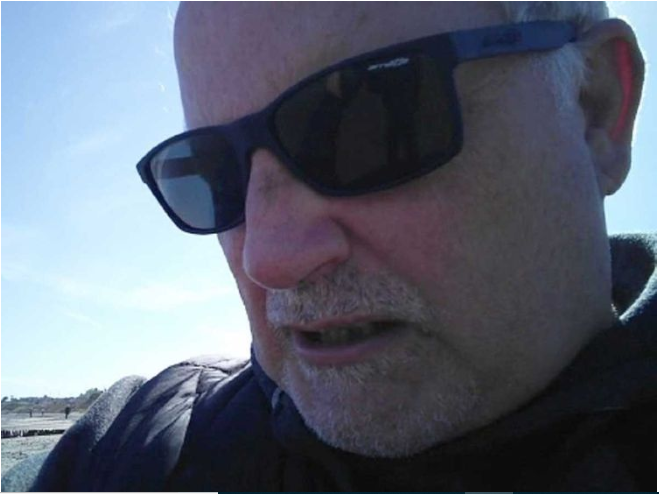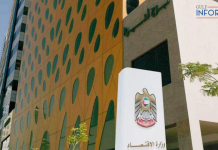Gulf News Foreign Correspondent Mick O’Reilly on life under Covid-19 lockdown
DAY 32 :Thursday April 30, 9amLike millions of others around the world, Gulf News Foreign Correspondent Mick O’Reilly is currently under Covid-19 lockdown. This is what life is like in social isolation in Ireland, where there are strict rules about who is allowed out, where, and under limited circumstances.
IS THERE ANYBODY OUT THERE?
AFTER THE UFOs, HERE COMES THE ASTEROID!

I had a little fun here yesterday poking fun at UFOs and aliens and the conspiracy theorists who are destroying telecommunication masts because they think they are linked in some very bizarre way to coronavirus. And no sooner had I written it that now comes work there’s an asteroid almost 2kilometres wide about to make a near pass to Earth.
What’s going on here?
Thankfully, scientists say it poses no danger.
Known as (52768) 1998 OR2, the asteroid will come to about 6 million kms away – 16 times further than the distance to the Moon – when it makes its closest approach.
The Arecibo Observatory in Puerto Rico has been tracking the 2kms-wide space rock as it edges nearer, after Nasa first spotted it in 1998.
Scientists have joked that the latest image of the asteroid look like it is wearing a mask due to dust and debris passing around it.
“The small-scale topographic features such as hills and ridges on one end of asteroid 1998 OR2 are fascinating scientifically,” said Dr Anne Virkki, head of Planetary Radar at the observatory.
“But since we are all thinking about Covid-19 these features make it look like 1998 OR2 remembered to wear a mask.”
Oh, that’ll really stoke up the conspiracy theory nutters now!
POTENTIALLY HAZARDOUS OBJECT
The asteroid is classed as a PHO – potentially hazardous object, not a bowl of Vietnamese soup – because it is bigger than 140 metres and will come within 8 million kms of Earth’s orbit, but no known PHO poses an immediate danger to the planet.
Nevertheless, scientists continue to keep an eye on the asteroid to see how it will move beyond 2020.
“The radar measurements allow us to know more precisely where the asteroid will be in the future, including its future close approaches to Earth,” explained Flaviane Venditti, a research scientist at the observatory.
“In 2079, asteroid 1998 OR2 will pass Earth about 3.5 times closer than it will this year, so it is important to know its orbit precisely.”
The team started observations on April 13 and will continue to collect data until April 23, when the asteroid will no longer be visible from the facility.
“Although this asteroid is not projected to impact Earth, it is important to understand the characteristics of these types of objects to improve impact-risk mitigation technologies,” Dr Virkki added.
I’m just so happy we only have to worry about the pandemic and not an asteroid strike that would be like something that got rid of the dinosaurs!
SOAKING UP THE SUN TO FIGHT COVID-19
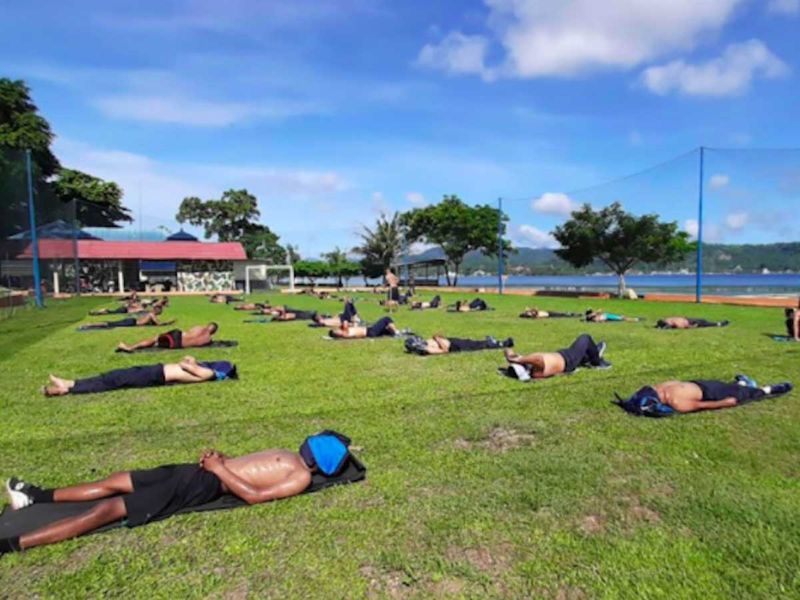
Last Friday, US President Donald Trump mused that light may be a useful tool in fighting this pandemic.
He went further, of course, and mused about taking some form of disinfectant internally – which rightly set off all sorts of warning bells and rightly so.
But in Indonesia, there are quite a few people who are turning to the sun as a way of fighting coronavirus.
From shirtless soldiers to teens suntanning on their parents’ driveways, Indonesians are soaking up rays like never before.
The rush to take up a practice usually associated with Bali-bound foreigners has been driven by unfounded claims on social media that sunlight – and the vitamin D it supplies – can slow or kill the virus.
“I always avoided the sun before because I didn’t want to get tanned,” said Theresia Rikke Astria, a 27-year-old housewife in Indonesia’s cultural capital Yogyakarta.
“But I’m hoping this will strengthen my immune system,” she added.
DOUBTS IN THE MEDICAL COMMUNITY
Medics have their doubts, but say a 15-minute burst of morning sunshine can be good for you.
“Exposing the body to direct sunlight is good to get vitamin D, not to directly prevent the disease,” said Dr. Dirga Sakti Rambe at Jakarta’s OMNI Pulomas Hospital.
Vitamin D, which comes from fish, eggs, milk and sunlight exposure, is important in maintaining a healthy immune system, he said. “Sunbathing does not kill the virus that causes Covid-19,” he said.
Whatever the science, one thing is for sure: there is no shortage of sunshine in the tropical 5,000-kilometre-long Southeast Asian archipelago.
The rush outdoors has led to an Indonesian government warning about the dangers of skin cancer, and calls for novice sun-seekers to slap on protection.
It was a rare caution in a place where sunbathing is not practiced widely, and beauty product commercials extol the virtues of fair skin.
Across Asia, pale skin has long been associated with a higher social class and skin-lightening products are big sellers.
A DISENFECTS THAT PROTECTS FOR 3 MONTHS
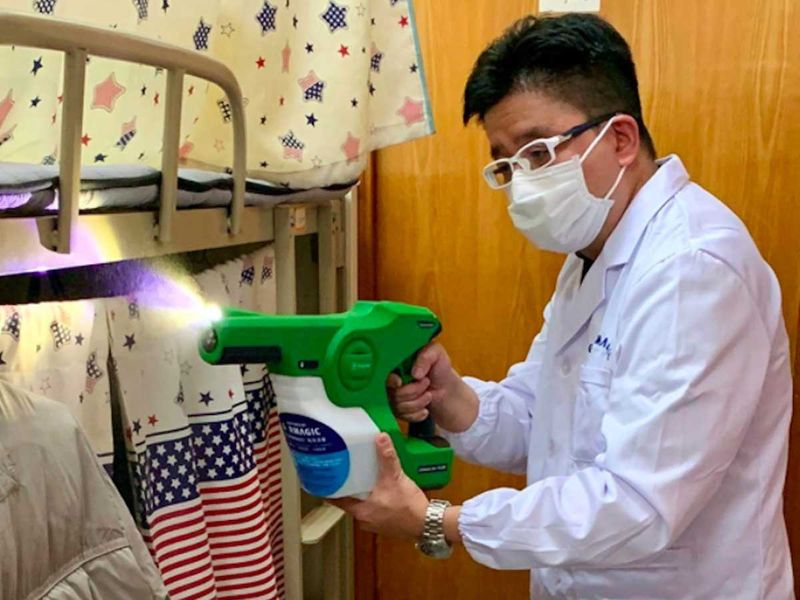
Whatever about ingesting disinfectant as President Trump may have sarcastically advised last week, there is one interested thing unfolding in Hong Kong.
There, an antiviral coating which could protect surfaces from coronavirus for 90 days has been developed by scientists.
The coating, called MAP-1, has taken 10 years to develop and can be sprayed on surfaces frequently used by the public, such as handrails and lift buttons to protect against coronaviruses, researchers at the Hong Kong University of Science and Technology (HKUST) say.
“These places are frequently touched, and, at the same time, serve as a very effective medium for transmission of diseases,” HKUST adjunct professor Joseph Kwan, one of the chief researchers, is quoted on SkyNews.
The spray-on coating is created from millions of nano-capsules containing disinfectants which remain effective in killing bacteria, viruses and spores even after it has dried, Prof Kwan said.
HEAT-SENSITIVE POLYMERS
He said MAP-1’s efficacy is increased by heat-sensitive polymers that encapsulate and release disinfectants on human contact – unlike common disinfectants such as bleach or alcohol.
The scientists say it is also non-toxic and safe for skin and the environment. MAP-1 was approved for official and mass consumer use in February after clinical tests at a Hong Kong hospital and care home earlier this year.
It will go on sale in Hong Kong shops next month and, with help from a charity, has been sprayed around the homes of more than a thousand low-income families in the city.
“I feel like it has strengthened our protection against the virus,” said Law Ha-yu, a mother-of-two living in a small home that was recently sprayed.
Shopping malls, schools and sports facilities across Hong Kong have been using the coating as well, according to researchers.
I’m no expert but this type of approach certain seems much, much safer that an injection of bleach!
BRIISH SOLDIERS TESTING INSECT REPELLENT AGAINST COVID-19
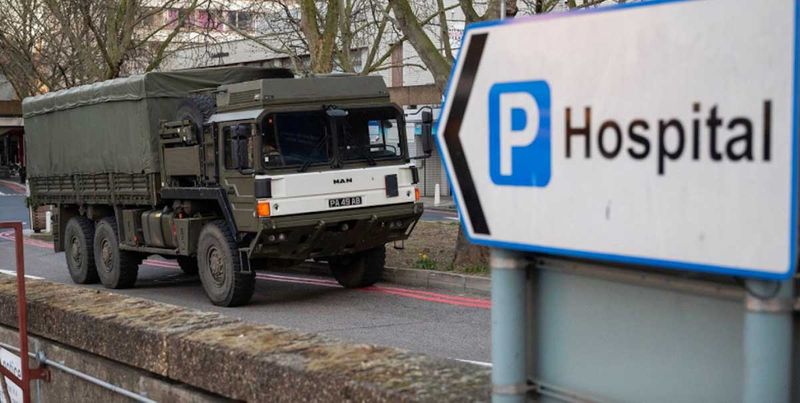
Here’s an interested development that I can see some people looking at and then dangerously giving it a go themselves. Please don’t!
But Britain’s defence laboratory will test whether a product found in insect repellent can also be used to kill the strain of coronavirus that causes Covid-19, some UK news outlets are reporting.
Citriodiol is known to be effective at destroying certain types of coronavirus, so the Ministry of Defence (MoD) is exploring its use against the strain behind the Covid-19 pandemic.
Scientists at the Defence Science and Technology Laboratory (DSTL) at Porton Down have been asked to conduct studies to provide further evidence, a spokesperson said.
“Further work is required to determine its full effectiveness, acquisition and distribution,” the MoD spokesperson added.
Last week it was revealed that some soldiers are already being issued with Mosi Guard, a type of insect repellent that contains citriodiol, as part of “enhanced force health protection measures” during the crisis.
SOLDIERS’ USE IS OPTIONAL
Priority is being given to personnel who are involved in operational roles and troops who are supporting the government’s effort to tackle coronavirus, according to military sources.
Use is optional, not obligatory, and the spray would be in addition to social distancing, handwashing and wearing personal protective equipment.
The Ministry of Defence said there has been no widespread rollout.
“Citriodiol is known to have anti-viral properties and has been used as a barrier against the SARS 1 virus,” the spokesperson said, referring to the strain that caused the 2003 epidemic.
“Its utility for protecting against COVID-19 is therefore being explored by the Ministry of Defence as an additional protective measure for personnel working on the response.”
But the tests now have British Members of Parliament curious and asking questions.
Two opposition defence spokespeople and the chair of the Defence Select Committee have written separately to Defence Secretary Ben Wallace to request further details.
Stewart McDonald of the Scottish National Party has asked to see the evidence the MoD relied upon to start issuing the insect repellent.
“If this is based on science, it is vital that the evidence is made public and all frontline workers are given the same advice,” he wrote in a letter. “If there is no evidence that it will be effective, then the MoD must explain why this product is being issued, creating a false sense of security and putting lives at risk. Clarity on this matter is of the greatest urgency.”
SWISS SAY CHILDREN UNDER 10 ARE IMMUNE TO COVID-19
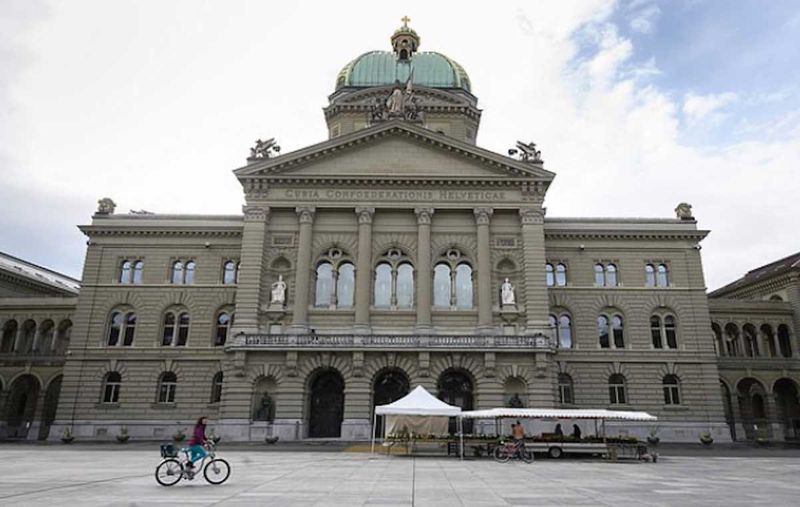
One of the hardest things emotionally about coronavirus and social-distancing restrictions is that grandparents can no long hug their little grandchildren.
The absence of human touch is indeed cruel.
But Swiss authorities and public health officials have said that there is little if any evidence that children under 10 are at risk from coronavirus.
And they now say it is now safe for children under the age of ten to hug their grandparents.
The relaxation of restrictions in the country comes after Swiss scientists concluded that grandparents are not at risk of catching Covid-19 from their young grandchildren as they do not have the “receptors” targeted by the virus.
“Children are very rarely infected and do not pass on the virus,” said Dr Daniel Koch, head of Switzerland’s infectious diseases unit at the Federal Office of Public Health. “That is why small children pose no risk to high-risk patients or grandparents.”
NO SIGNS OF ILLNESS
The new advice in Switzerland is only applicable to children who are showing no signs of the illness and are under the age of ten, and grandparents are still being advised to practice social distancing with their older grandchildren.
The elderly have also been advised not to take care of children for a prolonged period of time, or risk any other form of prolonged exposure.
Earlier in April, a study in France found that a British boy who had unknowingly contracted the disease on a skiing holiday and later come into contact with 172 people before being quarantined did not pass it on to anyone else.
He and 10 others were struck down with the disease while staying in the same ski chalet in the French Alps as Steve Walsh, one of the first Britons known to have the virus.
The child went to three different ski schools in eastern France and unknowingly infected, and mingled with other people.
All of those were placed in quarantine when the child tested positive, but only one other child contracted Covid-19. Neither of his siblings were struck down.
BOY DIDN’T SPREAD DISEASE
Doctors suggested the boy was not the spreader of the virus to the one other case because he came into contact with so many people.
Researchers who studied the child’s case said it suggests children are not a primary concern when considering the viruses’ main routes of transmission, and the case led to French viral disease experts to suggest that children might not be an important source of transmissions of this novel virus.
Clearly, if this theory is right, then it certainly seems to pave the way for children under 10 returning to schools sooner rather than in September at the earliest, as is the case across much of Europe.
And that would be good news indeed for parents who are feeling the strain of trying to teach children at home while balancing work pressures too.
WINSTON THE PUG IS OK
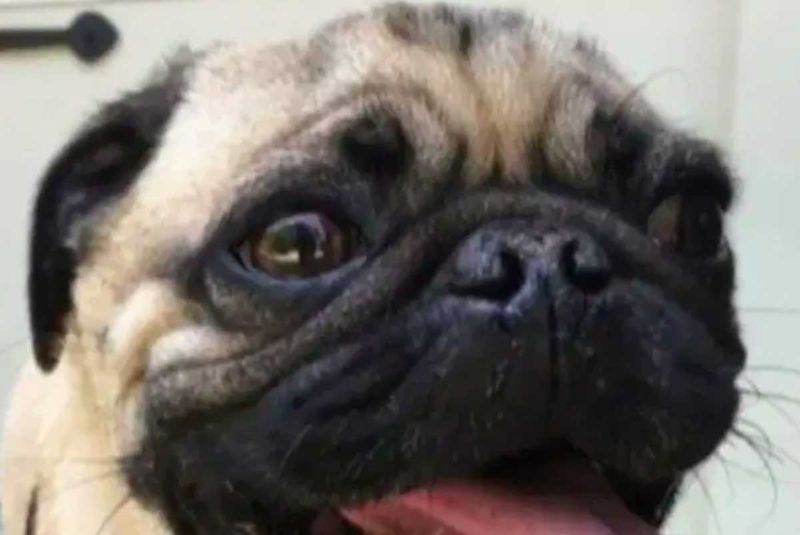
Here’s to Winston the Pug!
The little North Carolina dog was the first pooch in the US to test positive for Covid-19 but now he’s on the mend. His owners fell ill with the disease and Winston, who enjoys licking their plates, also picked it up.
However, the Centers for Disease Control in the US says the risk of animal-to-human transmission is very low. His owner, Heather McLean, said her beloved pet was coughing and sneezing and one day didn’t even want breakfast.
“And if you know pugs you know they love to eat,” she said. “So that seemed very unusual.”
Her son Ben added:“[The dog] licks all of our dinner plates and sleeps in my mom’s bed, and we’re the ones who put our faces into his face.”
BROKE, STRANDED AND HELPING OUT AT A THAI TEMPLE
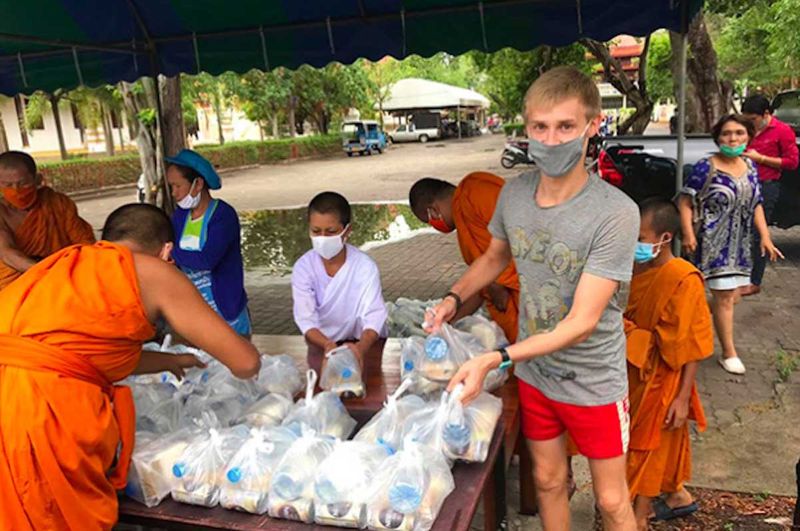
If you’re going to be stranded during this coronavirus pandemic, then being stuck on the Thai islands of Surat Thani can’t be all that bad.
But when you’re far away from home and have run out of money, then that’s a different proposition.
One Russian student has been surviving on meals from monks there – and helping out where he can – at a temple after all flights back to Russia were grounded.
The tourist identified only as Ivan, 25, has been staying at Wat Mai Pattararam in the Surat Thani municipality since March 26, Phra Khru Pisal Pattananukit told local Thai media earlier this week.
The acting abbot said the visitor arrived from Koh Samui. where he had been on holiday. Since he was running out of money, he asked if he could stay at the temple while waiting for a flight back to Russia.
The monk praised him for not sitting idly at the temple, saying he helped other monks to clean the premises and worked in the kitchen preparing free meals for people in the neighbourhood.
Ivan has refused to give his last name.
But he certainly deserves credit for doing his bit – enlightenment and karma and all of that that.
TEA BEING USED AGAINST COVID-19
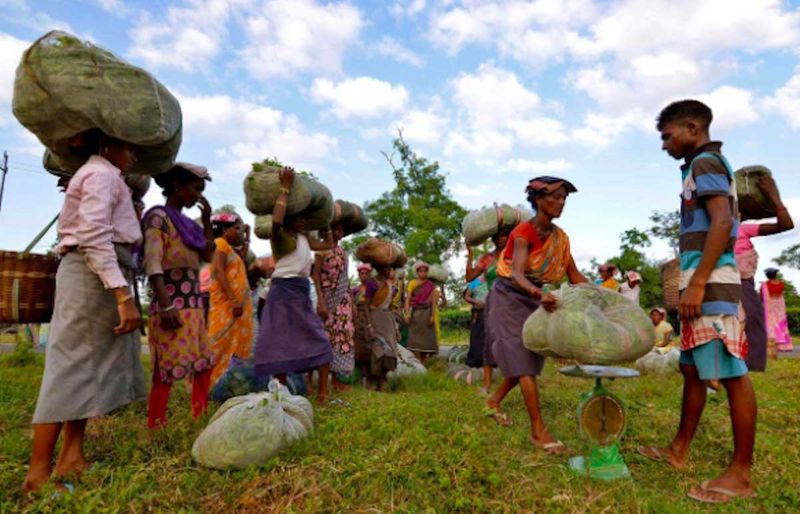
There’s nothing quite like a cup of tea to pick you up. And working from home, the kettle is always close to hand, ready for a brew.
Now it seems that many people around the world are also thinking the same way – with coronavirus causing a rare spike in the usually staid global tea market.
Lockdowns across India, however, also mean there’s a shortage of labour to pick the leaf.
Five countries – China, India, Kenya, Sri Lanka and Vietnam – account for 82 per cent of global tea exports, but strict restrictions on movement to contain the coronavirus pandemic have already disrupted the key leaf-picking season, delayed some shipments by about a month and triggered a spike in prices.
Fewer pickers combined with colder-than-normal temperatures last month are expected to trim output in top producer China this year, while production in No.2 grower India and Sri Lanka have also been impacted by labour and weather issues.
India’s output is likely to drop by 120 million kgs or 9 per cent in 2020 as the lockdown initially forced plantations to suspend plucking during the opening harvest – the prized first flush – and then operate with about half the workforce, said Prabhat Bezboruah, chairman of India’s Tea Board.
INDIA’s TEA EXPORTS SLUMPED 34% IN MARCH
The International Tea Committee (ITC) estimates India’s 2020 exports will fall 7 per cent.
In March, exports from India slumped 34 per cent, according to Reuters, and nearly halved from Sri Lanka, India’s Commerce Ministry and tea brokers say.
The bright spot is Kenya, the world’s top exporter, which has seen minimal interruption to harvest since March and, according to ITC, may see domestic output rise by 15 per cent this year.
Vietnam’s output is also expected to be largely unaffected, but it is a relatively smaller player.
Still, importers have already started feeling the pinch amid dwindling supplies from South Asia.
VITAL SHIPMENTS DELAYED
“Shipments from India have been delayed by an average of one month, and we have also experienced delays in the supply of tea from other countries, in particular Sri Lanka,” said Orimi trade, Russia’s leading tea manufacturer.
Prices for raw tea, which Russia imports, jumped as much as 30 per cent from pre-lockdown levels.
Plantations have struggled to collect the first flush crop in Darjeeling Hills, known for the world’s most expensive tea, as India ordered its 1.3 billion people indoors until May 3, so its modest public health system does not collapse under the weight of infections that have crossed 31,000.
Production from the second flush is set to drop more than 10 per cent, and later flushes will not compensate for those losses, said Kaushik Basu, secretary of the Darjeeling Tea Association.
In India, the first flush usually begins in March, while the second flush starts in May.
A shortage of truckers amid travel restrictions is also delaying movement to auctions and ports.
TEA DEMAND HIGH
“Demand for tea is higher than it was … tea in Russia has an image of a thing that, combined with lemon, boosts the immunity system,” said Ramaz Chanturiya, at the Rusteacoffee lobby. Russia, which has reported more than 93,000 coronavirus cases and over 800 deaths, is a major tea importer.
That said, industry participants and ITC do not expect the hot tea trend to last in the long term as major exporting countries had excess supply in 2019, although the demand-supply balance is likely to be disrupted in the shorter term.
If there’s one sure thing about any commodity, demand drives prices. And not having a supply also drives prices. That’s why a perfect storm in a teacup is brewing for all us tea lovers.
MEMES OF THE DAY
Thanks to my former neighbour Dougie too for sharing this with me on Facebook the other day. I do think there’s more than an element of truth to this new baby boom…

And then Gus, my first cousin, a retired autoworker in Windsor, Ontario, sent me this meme on Facebook. And yes, if could be quite a while before children are indeed back in the classroom
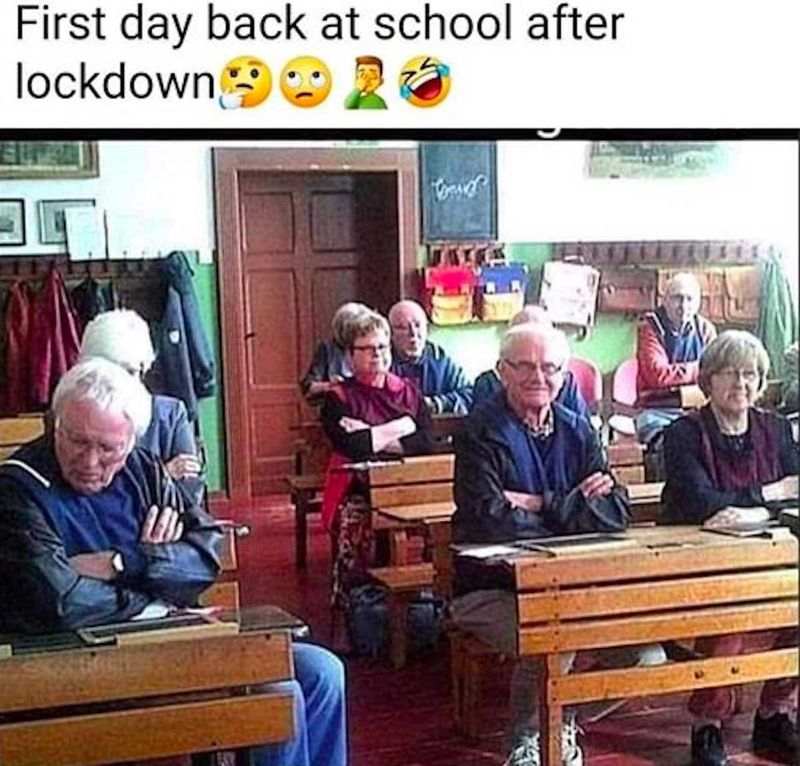
TAKING STOCK
HOW I’M PRETENDING TO GROW £10,000 IN PLAY MONEY
On Wednesday, I ended up on the plus side of the scales, but even a tiny profit of just £11.50 (Dh52.50) counts as a win. As my late father would say, it’s better than a kick in the pants.
A reminder, this is all pretend, and I set out at the beginning of my lockdown with £10,000 – about Dh45,000 – to invest on the London Stock Market. I don’t pay for trades and I can any amount but only at the end of a trading day. All play money.
As things stand since late Sunday night, I bought into drinks manufacturers Diageo, high-street food delivery company Ocado, British Telecom and a green energy company.
Diageo showed a very marginal increase on Wednesday, up 3p per share. PowerHouse Energy also was a riser, back up to 120p – making the 1,200 shares I invested on Sunday for 87p each a good speculative investment. British Telecom had been in positive territory for most of the day but slipped just as trading finished at 5pm in London, and it was a similar story for Ocado, the grocery delivery company.
Still a plus day – always a good thing.
This is my net worth after Wednesday’s trading:
Net worth £11,853.88
Diageo, 100 shares: £2766.50
Ocado, 100 shares: £1625.00
BT, 50 shares: £5992.50.
PowerHouse 1,200 shares: £1440.00
Cash in hand: £29.88
% Gain: 18.5 per cent
£ Gain: £1,853.88
There are two trading days left in the week and I would like to crack the £12,000 mark. Fingers crossed.
COVIDIOTS, YOBS AND GOONS
Here’s my daily collection of covidiots that serves as a reminder that not all life forms are intelligent.
COVIDIOCY IS A WORLDWIDE PHENOMENON
Yes, folks, there are covidiots lucking in every corner of the globe. Where there are lockdown restriction in place, there are covidiots waiting to crawl from under their rocks and break the rules – just to endanger everyone else.
South African media have reported that three people covidiots were arrested in Mpumalanga on earlier this week for allegedly pretending to be “Covid-19 officials on deployment” and using fake Covid-19 insignia on their vehicles.
According to police spokesperson Brigadier Leonard Hlathi, police received information about two vehicles branded with Covid-19 signage which were allegedly used to commit crime.
After following up, the police tracked two vehicles matching the description they were given.
The three were arrested and charged with the contravention of lockdown regulations for moving between provinces and for using fake police and official identification.
Their vehicles were confiscated too.
ANTI-QUARANTINE ACTIVISTS CONTRACTS COVID-19
Sorry, I know I shouldn’t make fun of the afflicted but… this is too hard to resist.
Audrey Whitlock had some very strong feelings about the lockdown in her home state of North Carolina – so much so that she became an organiser of a group called ReOpen NC.
It make a lot of noise on social media, Facebook and the like, drumming up support among covidiots.
The first hint of trouble came when our heroine skipped two rallies. In fact, she was under quarantine for testing positive for coronavirus.
“I remained in isolation/self-quarantine at my home per the direction of my county health department. I have not attended any events for ReOpen NC,” Whitlock said on Facebook, … “as an asymptomatic Covid-19 positive patient.
Oh, the irony! I just love it.
SONGBIRD RITA ORA UNDER FIRE
British singer Rita Ora has come under fire for posting saucy snapshots from quarantine at a luxury holiday home in the south of England. She has publicly supported lockdown rules for the little people.
But locals say Ora — who posted bikini pics to Instagram — has been having the time of her life with pals at the farmhouse. They are reportedly enjoying bike rides, “shooing away neighbours on public footpaths and using drones to follow them.”
The Sun newspaper said Ora and friends felt free to tromp on a local farmer’s land.
One local write on Facebook: “Surely she should respect the rules and have stayed in [expletive] London?”
Another resident said her seven-year-old son was “reduced to tears” by Ora’s security screaming at them when they were on a public path. “Minutes later a drone sent up from the property followed us as we walked away.”
COVIDIOT ‘INFLUENCER’ BUSTED
A wealthy Instagram “influencer” will have to see how much he “influences” an Aussie judge at a time when the nation’s justice system is dealing with the coronavirus pandemic.
Daniel Langanis, 20, who flaunts his luxury lifestyle on social media, was arrested for stealing groceries worth $95 (Dh227).
Among the pilfered treasures were Skittles and chicken thighs. His antics were captured on CCTV. He has now pleaded guilty to shoplifting.
He told Australian police he “could have paid for the groceries but didn’t.” He is now on a six-month $300 good behaviour bond and called it all a “stupid mistake.”
Judge Simon Young told him: “It wasn’t a mistake; you’ve made a decision.”
QUESTIONS AND ANSWERS
I’m not an expert, but I might be able to help you make a bit of sense of this. And we can all get through it together. Isn’t this what this is all about.
Send your questions for me to Readers@gulfnews.com.
That’s it for now. Let’s check in with each other tomorrow. I have used files from Reuters, Twitter and other European and North American media outlets in today’s blog. And remember to stay safe.
Mick O’Reilly is the Gulf News Foreign Correspondent based in Europe

